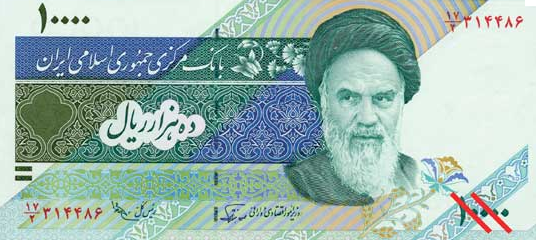Internal conditions in Iran continue to deteriorate. The street value of Iran's currency (the rial) has hit new lows as the currency decline spirals out of control.
NBC News: Street traders in Iran say the country's currency has struck a new record low against the U.S. dollar, the second consecutive day it has fallen sharply.
They say the rial on Monday dropped some 5 percent, with 25,650 rials now needed to purchase one dollar. A day earlier it fell nearly 7 percent.
The currency's slide is a sign Western sanctions over Iran's nuclear program are biting, although Iran says it has enough reserves and blames nervous markets. The West suspects Iran aims to build nuclear weapons. Iran denies that.
That's a whopping 52% discount to the official exchange rate.
And foreign currencies are even more difficult to access these days because international banks are reluctant to help Iran set up foreign accounts, transfer funds, or otherwise transact globally. This is driven by the situation with Standard Chartered and HSBC (who got themselves into a bit of trouble). Some banks in China have supposedly been helping Iran (see this NYT article), but that's probably been shut down as well.
With no official payment systems in place and no access to foreign currency accounts, Iran is buying up gold from Turkey to use as a form of currency. Since gold does not pass through central banks' controlled payment systems, it is harder to track Iran's transactions that may violate Western sanctions.
WSJ: Gold exports [from Turkey to Iran] in the first seven months of the year are already five times more than the total in 2011 owing to rising demand from Iran, which accounted for only 4% of sales two years ago, when its purchases started.
Without access to foreign currency (and unable to afford dollars in the street), the Iranian people are no longer able to travel abroad and are effectively trapped in their own country (the official exchange rate is only permitted for pilgrimage trips).
LA Times: Homayoun Hashemi had imagined visiting his daughter, off studying in the United States. But as the value of the Iranian rial plunges, that trip is steadily slipping out of his reach.
“Now my wife and I are almost forbidden to go visit our daughter,” the 60-year-old engineer lamented. “The trip is not affordable.”
As Iran is pressed by Western sanctions over its disputed nuclear program, the beleaguered economy is putting added pressure on ordinary Iranians through inflation and triggering pleas for the Iranian central bank to step in.
The official inflation number out Iran stands at 23.5%, but anecdotal evidence suggests that it is much higher. A number of Iran's politicians are apparently pushing for the central bank to stabilize the currency.
Reuters: The rial's slide threatens to push up inflation and fuel capital flight from Iran and has inflamed political divisions within the country, with foes of President Ahmadinejad in the legislature accusing his administration of foot-dragging and exacerbating the situation.
A group of a few senior lawmakers heaped criticism on the central bank and its governor Mahmoud Bahmani for failing to stabilize the currency during a closed meeting in parliament on Tuesday, the Mehr news agency reported.
"Most of the discussions of representatives was for the government to enter the exchange market as quickly as possible and inject currency," said Gholamreza Taj-Gardoun, the deputy of the parliament's planning and budget committee, according to the Iranian Students' News Agency (ISNA).
But the central bank has no such ability. The only way the currency can be stabilized is if the central bank were to use its reserves of dollars (or gold) to buy the rial. And it is highly unlikely that Tehran will support such action given how precious foreign reserves are currently.
Iran's official answer to the economic conditions spiraling out of control is to develop a "sanctions resistant" economy via a series of projects called Mehre Mandegar (Lasting Kindness).
FARS News: [Mehrabian, a former industries minister] said of 905 Mehre Mandegar projects, 52 projects are underway in oil industry, worth 700 trillion rials, adding completion of the projects will have a remarkable impact on the country's economic growth especially on employment.
He added that the 9th and 10th administrations of President Mahmoud Ahmadinejad, have accelerated implementation of projects in comparison with former administrations amid remarkable rise in total investment.
"One reason why current administration insists on completion of Mehre Mandegar projects is that the government believes that it should use its mandate and budget to complete half-finished projects so that next administrations to be able to start new projects and to start a new era in industrial and economic development of the country."
The street currency traders however are not holding their breath for these "projects" to be completed as the rial continues to fall.
- English (UK)
- English (India)
- English (Canada)
- English (Australia)
- English (South Africa)
- English (Philippines)
- English (Nigeria)
- Deutsch
- Español (España)
- Español (México)
- Français
- Italiano
- Nederlands
- Português (Portugal)
- Polski
- Português (Brasil)
- Русский
- Türkçe
- العربية
- Ελληνικά
- Svenska
- Suomi
- עברית
- 日本語
- 한국어
- 简体中文
- 繁體中文
- Bahasa Indonesia
- Bahasa Melayu
- ไทย
- Tiếng Việt
- हिंदी
Iranian Rial Trades At 52% Below Official Exchange Rate On Streets
Published 09/13/2012, 02:25 AM
Updated 07/09/2023, 06:31 AM
Iranian Rial Trades At 52% Below Official Exchange Rate On Streets
3rd party Ad. Not an offer or recommendation by Investing.com. See disclosure here or
remove ads
.
Latest comments
Install Our App
Risk Disclosure: Trading in financial instruments and/or cryptocurrencies involves high risks including the risk of losing some, or all, of your investment amount, and may not be suitable for all investors. Prices of cryptocurrencies are extremely volatile and may be affected by external factors such as financial, regulatory or political events. Trading on margin increases the financial risks.
Before deciding to trade in financial instrument or cryptocurrencies you should be fully informed of the risks and costs associated with trading the financial markets, carefully consider your investment objectives, level of experience, and risk appetite, and seek professional advice where needed.
Fusion Media would like to remind you that the data contained in this website is not necessarily real-time nor accurate. The data and prices on the website are not necessarily provided by any market or exchange, but may be provided by market makers, and so prices may not be accurate and may differ from the actual price at any given market, meaning prices are indicative and not appropriate for trading purposes. Fusion Media and any provider of the data contained in this website will not accept liability for any loss or damage as a result of your trading, or your reliance on the information contained within this website.
It is prohibited to use, store, reproduce, display, modify, transmit or distribute the data contained in this website without the explicit prior written permission of Fusion Media and/or the data provider. All intellectual property rights are reserved by the providers and/or the exchange providing the data contained in this website.
Fusion Media may be compensated by the advertisers that appear on the website, based on your interaction with the advertisements or advertisers.
Before deciding to trade in financial instrument or cryptocurrencies you should be fully informed of the risks and costs associated with trading the financial markets, carefully consider your investment objectives, level of experience, and risk appetite, and seek professional advice where needed.
Fusion Media would like to remind you that the data contained in this website is not necessarily real-time nor accurate. The data and prices on the website are not necessarily provided by any market or exchange, but may be provided by market makers, and so prices may not be accurate and may differ from the actual price at any given market, meaning prices are indicative and not appropriate for trading purposes. Fusion Media and any provider of the data contained in this website will not accept liability for any loss or damage as a result of your trading, or your reliance on the information contained within this website.
It is prohibited to use, store, reproduce, display, modify, transmit or distribute the data contained in this website without the explicit prior written permission of Fusion Media and/or the data provider. All intellectual property rights are reserved by the providers and/or the exchange providing the data contained in this website.
Fusion Media may be compensated by the advertisers that appear on the website, based on your interaction with the advertisements or advertisers.
© 2007-2024 - Fusion Media Limited. All Rights Reserved.
